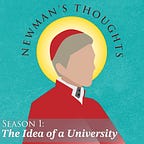Reading for Day 14: The Idea of a University, Discourse II, Theology a Branch of Knowledge § 1
Complete Recording of Discourse II @ Catholic Culture Audiobooks
Paperback with Introduction by Dr. Don Briel available @ Cluny Media
Full online text of The Idea of a University and other works by St. John Henry Newman are available @ the National Institute for Newman Studies’ Newman Reader
There were two questions, to which I drew your attention, Gentlemen, in the beginning of my first Discourse, as being of especial importance and interest at this time: first, whether it is consistent with the idea of University teaching to exclude Theology from a place among the sciences which it embraces; next, whether it is consistent with that idea to make the useful arts and sciences its direct and principal concern, to the neglect of those liberal studies and exercises of mind, in which it has heretofore been considered mainly to consist. These are the questions which will form the subject of what I have to lay before you, and I shall now enter upon the former of the two.
1.
It is the fashion just now, as you very well know, to erect so-called Universities, without making any provision in them at all for Theological chairs. Institutions of this kind exist both here and in England. Such a procedure, though defended by writers of the generation just passed with much plausible argument and not a little wit, seems to me an intellectual absurdity; and my reason for saying so runs, with whatever abruptness, into the form of a syllogism:—A University, I should lay down, by its very name professes to teach universal knowledge: Theology is surely a branch of knowledge: how then is it possible for it to profess all branches of knowledge, and yet to exclude from the subjects of its teaching one which, to say the least, is as important and as large as any of them? I do not see that either premiss of this argument is open to exception.
As to the range of University teaching, certainly the very name of University is inconsistent with restrictions of any kind. Whatever was the original reason of the adoption of that term, which is unknown, I am only putting on it its popular, its recognized sense, when I say that a University should teach universal knowledge. That there is a real necessity for this universal teaching in the highest schools of intellect, I will show by-and-by; here it is sufficient to say that such universality is considered by writers on the subject to be the very characteristic of a University, as contrasted with other seats of learning. Thus Johnson, in his Dictionary, defines it to be "a school where all arts and faculties are taught;" and Mosheim, writing as an historian, says that, before the rise of the University of Paris,—for instance, at Padua, or Salamanca, or Cologne,—"the whole circle of sciences then known was not taught;" but that the school of Paris, "which exceeded all others in various respects, as well as in the number of teachers and students, was the first to embrace all the arts and sciences, and therefore first became a University."
If, with other authors, we consider the word to be derived from the invitation which is held out by a University to students of every kind, the result is the same; for, if certain branches of knowledge were excluded, those students of course would be excluded also, who desired to pursue them.
Is it, then, logically consistent in a seat of learning to call itself a University, and to exclude Theology from the number of its studies? And again, is it wonderful that Catholics, even in the view of reason, putting aside faith or religious duty, should be dissatisfied with existing institutions, which profess to be Universities, and refuse to teach Theology; and that they should in consequence desire to possess seats of learning, which are, not only more Christian, but more philosophical in their construction, and larger and deeper in their provisions?
But this, of course, is to assume that Theology is a science, and an important one: so I will throw my argument into a more exact form. I say, then, that if a University be, from the nature of the case, a place of instruction, where universal knowledge is professed, and if in a certain University, so called, the subject of Religion is excluded, one of two conclusions is inevitable,—either, on the one hand, that the province of Religion is very barren of real knowledge, or, on the other hand, that in such University one special and important branch of knowledge is omitted. I say, the advocate of such an institution must say this, or he must say that; he must own, either that little or nothing is known about the Supreme Being, or that his seat of learning calls itself what it is not. This is the thesis which I lay down, and on which I shall insist as the subject of this Discourse. I repeat, such a compromise between religious parties, as is involved in the establishment of a University which makes no religious profession, implies that those parties severally consider,—not indeed that their own respective opinions are trifles in a moral and practical point of view—of course not; but certainly as much as this, that they are not knowledge. Did they in their hearts believe that their private views of religion, whatever they are, were absolutely and objectively true, it is inconceivable that they would so insult them as to consent to their omission in an Institution which is bound, from the nature of the case—from its very idea and its name—to make a profession of all sorts of knowledge whatever.




